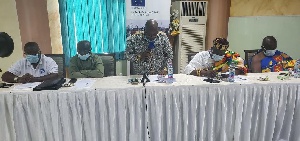 Some dignitaries at the stakeholders meeting
Some dignitaries at the stakeholders meeting
Stakeholders in the fishery sector are demanding responsible governance from the government, fishing communities, and other stakeholders to promote secured landing sites for sustainable small-scale fisheries to sustain their livelihoods and that of the entire nation.
Landing sites enable fisher folks to preserve and repair canoes, smoke or process fish, and keep their other fishing items.
The demand followed an observation made on how landing sites were being sold off to companies in the hospitality industry and individuals interested in oil and gas production as well as those who wanted to build residential facilities, at coastal areas.
The stakeholders were Friends of the Nation (FoN), the Food and Agriculture Organisation (FAO), the European Union, traditional leaders, Fisheries Commission, Local Government Service, Lands Commission, Land Use Planning Authority, and fisher folks.
They made the demand at a National Multi-Stakeholder Policy Dialogue Workshop held on Thursday in Accra to develop a roadmap to ensure that landing sites were properly demarcated, documented and legally given approvals.
This would ensure that landing sites lasted for fisher folks and remained a legacy for their communities.
Mr Donkris Mevuta, Executive Director of FoN, said it was for this challenge that the European Union-funded a project dubbed: “Far Ban Bo” - the process of piloting the mapping and documentation of five fish landing sites.
The sites were the Abutiakope and Kedzikpe communities in the Keta District, the Whuti community in the Anloga District, the Anomabo community in the Mfantsiman Municipal (Central Region), and the Abuesi community in the Shama District (Western Region).
The end product of the exercise, he said, was to map, document and secure the landing sites for the small-scale fishers and processors and ensure the security of tenure for them.
He explained that the step would ensure that women had long term access to fish landing sites to purchase fish, process it, and market to sustain their livelihoods and promote a healthy nutrition for the nation at large.
Mr Mevuta reiterated that fish landing sites in Ghana were useful entry points for participatory development of the fishing industry and were the geographical space where the majority of actions took place to support onshore fishery-based livelihoods.
Dr Wordsworth Odame Larbi, a Land Tenure Officer, FAO, said about five million people in Ghana were vulnerable to becoming food insecure if problems associated with landing sites were not resolved.
In Ghana, he said, 68 per cent of lands were suitable for agricultural practices, however, it was unfortunate that only 10 per cent were registered for such purposes.
He gave an assurance that the FAO was going to strengthen its partnership with the Ministries of Fisheries and Aquaculture and Food and Agriculture to achieve the Sustainable Development Goals ‘1 & 3’ of ending Hunger, and promoting good health and well-being.
He entreated stakeholders to encourage governments to integrate instruments adopted by the International Community to promote responsible governance and protect the operations of the fishery sector.
Mr Kyei Kwadwo Yamoah, Programmes Manager, FoN, said with the numerous contributions of landing sites, it also faced challenges like climate change, coastal erosion, and sea level rise.
Others were toxic oil pollution, oil, and gas activities, the use of chemicals through spraying, and illegal fishing activities.
Togbui Kpemini Gawu V of Whuti, Anloga District, said encroaching on landing sites did not only increase food insecurity among fisher folks and their communities but also deepened poverty situations among them.
He, therefore, called for a collaborative effort to implement policies that would protect the sites and secure livelihoods.
Mr Mubeen Mohammed, Development Planning Officer, Ga East Municipal, speaking on steps undertaken by Metropolitan, Municipal and District Assemblies to support the step, said they and identified in fishing communities the weak involvement of communities in the management of fisheries resources.
Moreover, there was a lack of alternative livelihoods for coastal communities, low level of private sector involvements, weak extension service delivery, and high cost of aquaculture inputs.